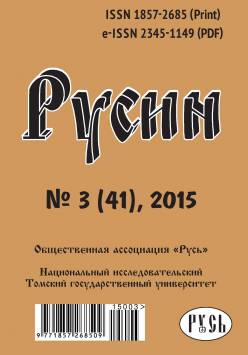The principality of Moldavia in the mid-18th century: impressions of a traveler from the West
The paper dwells on the representations of the Principality of Moldavia in the letters of a French traveler, who visited it in the middle of the 18th century. In the early 16th century, Moldavia became a vassal state of the Ottoman Empire, which lasted for more than three centuries. After the attempt to liberate from Turkish power with the help of Peter I in 1711, the sultan entrusted the governing of the Principality of Moldavia to the Phanariote Greeks. The letter about the Moldavian principality was written on October 22, 1756, in Bratislava. It means that the traveler visited Moldavia either in 1756 or in 1755. The letter was published in Paris in 1777, in a unique compilation by Joseph de La Porte (1718-1779). This is an exceptionally valuable multi-volume edition of travel notes that contains important information about many countries of the world. Epistolary discourse is considered to be an effective tool of modern historiography to explore public and private communication, as it contains the information on a particular society, its history and culture. The above-mentioned letter contains interesting information about Moldavia in the mid-18th century, drawn on personal impressions of an anonymous author. This brief firsthand description of the country, its position and culture is important as it belongs to a traveler from West Europe. It should be emphasised that such sources on the history of Eastern Europe and the Slavic lands dated by the 18th century are very scanty.
Keywords
Молдавское княжество, французский путешественник, эпистолярный дискурс, XVIII в, Principality of Moldavia, French traveler, epistolary discourse, 18th centuryAuthors
| Name | Organization | |
| Elezovic Dalibor M. | University of Pristina | dalibor.elezovic@pr.ac.rs |
| Deletic Zdravko M. | University of Pristina | zdeletic@yahoo.com |
References
_3_2018_1525169189.jpg)
The principality of Moldavia in the mid-18th century: impressions of a traveler from the West | Rusin. 2018. № 1 (51). DOI: 10.17223/18572685/51/8
